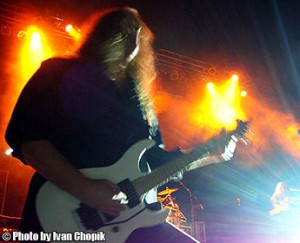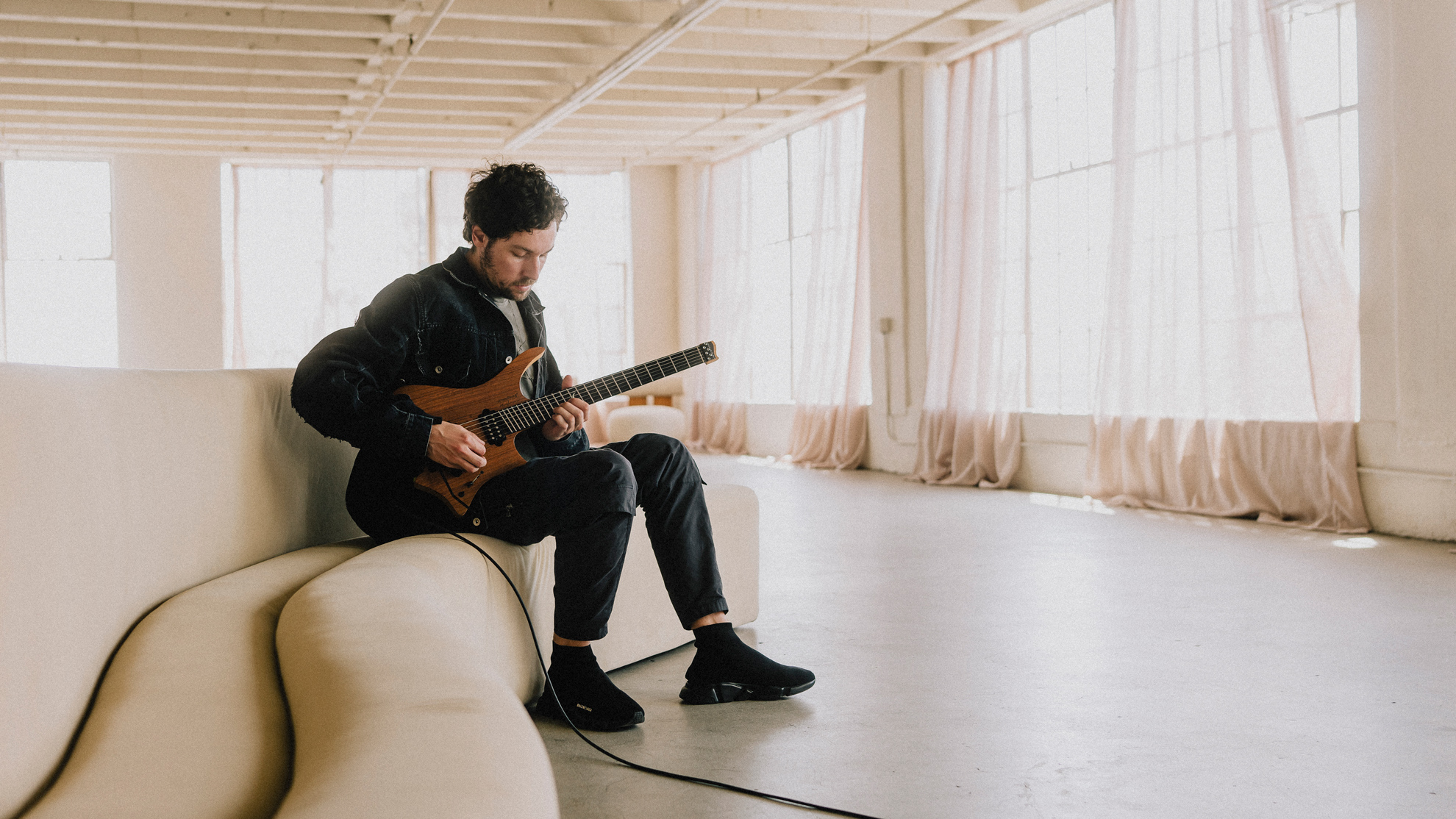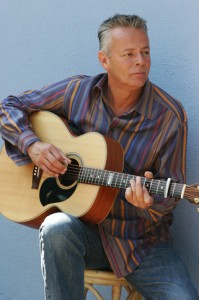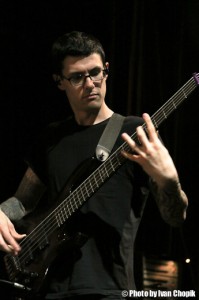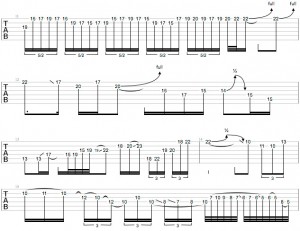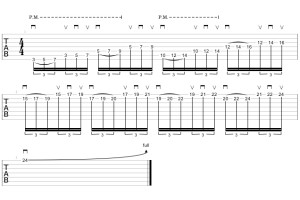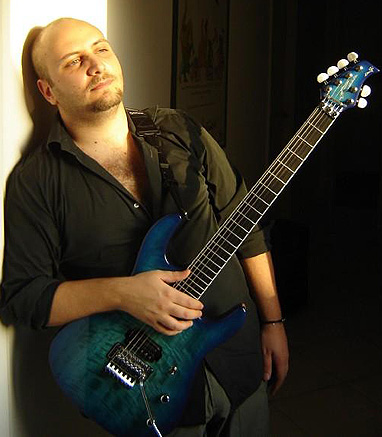 Marco Sfogli is at the forefront of the new generation of virtuoso guitarists. He first appeared on the map after handling the guitar duties on Dream Theater vocalist James LaBrie’s solo album, Elements of Persuasion. On this release, Marco established himself as a passionate and highly proficient guitarist with a great sense of melody and phrasing. By drawing inspiration from artists such as Andy Timmons and John Petrucci, Marco has been steadily developing his own distinctive playing and writing style.
Marco Sfogli is at the forefront of the new generation of virtuoso guitarists. He first appeared on the map after handling the guitar duties on Dream Theater vocalist James LaBrie’s solo album, Elements of Persuasion. On this release, Marco established himself as a passionate and highly proficient guitarist with a great sense of melody and phrasing. By drawing inspiration from artists such as Andy Timmons and John Petrucci, Marco has been steadily developing his own distinctive playing and writing style.
Marco recently released his first solo instrumental album, titled There’s Hope. This album marks a new step in his career and showcases his ability to write well-crafted songs filled with memorable melodies, as well as plenty of face-melting guitar work. There’s Hope is a breath of fresh air in the guitar community with its great production, clear sound, and songs that can stand on their own.
IC: What’s going on right now in the world of Marco Sfogli?
MS: The world of Sfogli right now is preparing the very first solo gig, which is going to be on April 25th here in my town [Caserta, Italy], and then some clinics and showcases. Also, the new James LaBrie album is in progress.
IC: Do you anticipate a tour behind your new solo album, There’s Hope?
MS: That’s definitely a hard question, because gigging for a solo record is always hard, because there is not that following in terms of people that actually go to the shows. I’m actually looking for some promoters and managers – someone who will handle all the bureaucratic stuff and the managing of the gigs, and all that. So I definitely would love to, but I have to find the right people to set up a tour, and eventually leave for one.
IC: You’re playing on various sessions, you have just released your first solo record – are you doing any additional work or do you find that these projects are enough to sustain a career?
MS: Well, I teach extensively, actually, and that’s my main source of income right now. Teaching has been always part of my daily routine since maybe 2000 or 2001. So I didn’t stop teaching ‘cause that’s part of daily practice – exchanges of thoughts with students. I’m doing less stuff, but maybe more important than it was before. But I try to keep it busy, and that’s very, very cool for a musician. It’s good to never stop.
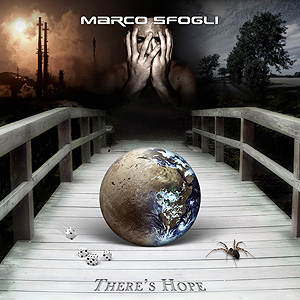 IC: How has the response been to the release of your first solo record?
IC: How has the response been to the release of your first solo record?
MS: Well, I’ve seen a couple of reviews so far, and every one is good – a couple of thumbs up. It sounds like they enjoyed the record, and I don’t know yet about how many copies are sold, but maybe in a couple of… three months maybe, I’ll have the list of the copies sold and I’ll know more about it. But I’ve definitely seen some good reactions on the web, and even people asking at shops for my record – that’s very, very good and it’s widely distributed. I’m definitely happy about the way it’s being promoted and you can find it almost everywhere, even on demand on some guitar net stores. So it’s definitely going very well for being a solo record.
IC: This is definitely one of the strongest instrumental guitar records I’ve heard in a while. I find that in your writing there is a great amount of strong melodies and that’s something that oftentimes gets lost on instrumental guitar records. What’s the writing process like for you?
MS: Well, it’s more of an inspiration thing. I’m not one of those guys who can sit down, and tell himself: ‘I’m going to write a song.’ It doesn’t happen, it doesn’t work for me. It never works for me and it probably never will, so all I do is search for inspiration – maybe just driving and doing some stuff or chilling out, and I’ll have this melody stick in my mind and as soon as I get home I try to put it down. That’s the main writing approach for me – it’s just about inspiration. Then all the rest comes up at the right moment.
IC: So the melody is the starting point for you?
MS: Yes, definitely – the melodic aspect.
IC: Talk to me a little bit about your influences. I hear John Petrucci, Steve Lukather, and Andy Timmons reflected in your playing, although on the new record you seem to be developing more of your own sound and your own playing approach. Is that something you’re consciously working on and trying to attain?
MS: Absolutely. It’s something you never stop working on, actually. You’re going to see how influences can come, listening to so many people and guitar players. The influences came by very early, and then I tried to find my own voice. This is something that goes on for years, and will be going on for years.
IC: Have you had any new influences lately – any different people that you’ve been listening to?
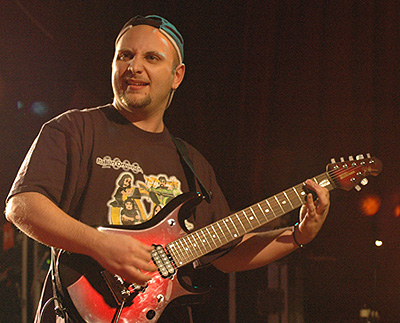 MS: Not definitely on the guitar side, but maybe on the writing side – I’m listening to a lot of new modern bands like Nickelback, Linkin Park, or just people like Daughtry, which I love. That kind of writing approach still amazes me. As far as guitar players go, I’m not sure – maybe new players like… Guthrie Govan, actually, amazes me every time. I saw him live last November – he’s a cool dude and an amazing player.
MS: Not definitely on the guitar side, but maybe on the writing side – I’m listening to a lot of new modern bands like Nickelback, Linkin Park, or just people like Daughtry, which I love. That kind of writing approach still amazes me. As far as guitar players go, I’m not sure – maybe new players like… Guthrie Govan, actually, amazes me every time. I saw him live last November – he’s a cool dude and an amazing player.
IC: What are you working on in terms of your playing right now? What’s your focus as a guitar player and musician?
MS: Keeping the chops up for the eventual tour, and focusing on the techniques I’m not that good at.
IC: Which would those be?
MS: I never been a great sweep picker, for instance. I’m trying to break down the technique and fix some movements. That’s the next aspect I’m working on. From there, just trying to keep what I call the ‘woken mind’ when it comes to playing, which is an important aspect of playing – being set up every night to play like on the record. That’s a hard issue, but I’m working on it and it’s more about the mental side of playing – being relaxed and finding the right spot, the right moment.
IC: What was one the hardest moments for you on the record as far as recording it?
MS: Outside of mixing? (laughs) Outside of mixing, which I’m not a pro at… I had to mix it by myself, because the rates are very, very heavy. Since the budgets for solo records are very low and mixing rates are up to the stars, I decided to do it by myself. But aside from that, I think one of the most challenging songs off the record was maybe the title track “There’s Hope” – there’s a couple of crazy tapping licks which are really hard to do, because I’ve never been a huge tapper. So I learned that part and I put it into the song, and I had to relearn it – and that’s very, very hard. That’s maybe the hardest part of the record. It’s not the whole song, usually – it’s maybe some spots in the songs that are very hard to play.
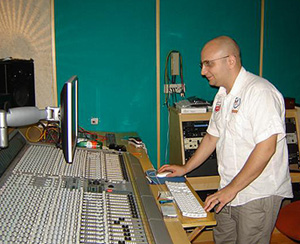 IC: Where was the album recorded?
IC: Where was the album recorded?
MS: In my home studio, which actually is my bedroom. I don’t have a studio, it’s just – I have a couple of monitors, a Pro Tools system… definitely a small, small home studio. I did all the guitars here in my bedroom: basically micing the cab, keeping at bedroom levels, and trying to make it sound as convincing as possible. Then when it came to recording the drums I went to a studio, because I couldn’t set up a drum place here, so I had to book a studio and we did the drums there. Then I came back home and did the definitive guitar tracks and then mixed it with the help of a friend, together, and that’s the whole production process.
IC: That’s very interesting. I wouldn’t have guessed that most of this was recorded at home.
MS: Yes – 90% of the record, actually.
IC: It’s refreshing to hear really good production on a guitar instrumental record, so I figured you went the whole nine yards and went out and did this in a full studio. So that’s very inspiring to hear.
MS: Thanks!
IC: What gear did you use for your solo album, as compared to Elements Of Persuasion?
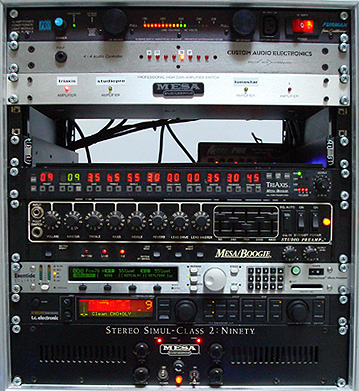 MS: Well, on the Elements Of Persuasion record we used basically a couple of amps – that’s all. It was a Dual Rectifier Head, and a Mesa/Boogie Mark 3 Combo – and no additional overdrive boxes. It’s just the amps cranked up into a room and playing. As far as my record goes, I used a lot of different stuff: real tube amps and also some virtual amps like Guitar Rig. For some stuff I used a cheap Boss GT-6, or even a Behringer V-AMP also for some cleans. Most of the rhythms I did with a Mesa/Boogie Studio Preamp and a TriAxis.
MS: Well, on the Elements Of Persuasion record we used basically a couple of amps – that’s all. It was a Dual Rectifier Head, and a Mesa/Boogie Mark 3 Combo – and no additional overdrive boxes. It’s just the amps cranked up into a room and playing. As far as my record goes, I used a lot of different stuff: real tube amps and also some virtual amps like Guitar Rig. For some stuff I used a cheap Boss GT-6, or even a Behringer V-AMP also for some cleans. Most of the rhythms I did with a Mesa/Boogie Studio Preamp and a TriAxis.
For some leads I used the brand new Mesa/Boogie Lone Star Head. Some bluesier songs like “Spread The Disease” or maybe “Seven” were recorded with the Lone Star – definitely all Mesa/Boogie stuff by the way, besides the virtual stuff that some friends lent me. I actually wanted to rerecord the virtual parts, but there was so much fire in some songs, so much passion, that I didn’t want to lose that by rerecording with maybe better sounds. So I kept the guitars from demos and that worked for me, and from the reviews I’m reading it worked for journalists, too.
IC: I’m really curious about that particular single coil sound you get on “Never Forgive Me.” What did you use to get that sound?
MS: Well, that’s one of my Rash signature guitars, which has single-coils. It’s basically a Superstrat guitar – it has a [DiMarzio] D Sonic in the bridge and a couple of [DiMarzio] Cruisers in the neck and the middle and it has a mahogany body. You actually can see it in one of the YouTube videos of me playing to a sort of Larry Carlton backing track. That’s the guitar I used for a lot of the leads, actually, because I love the mahogany sound. The other guitar I’m using is also a signature one, but it has an alder body – it’s lighter, but it has less low frequencies than the mahogany one. I still love that single-coil sound more than the humbucking sound for some of the leads. The combination between the single-coils and the Lone Star was a winning one, because I’ve always been a fan of Andy Timmons and I was basically using the same kind of setup – different hands, of course, but the same setup.
IC: Did you use any pedals to boost your tone?
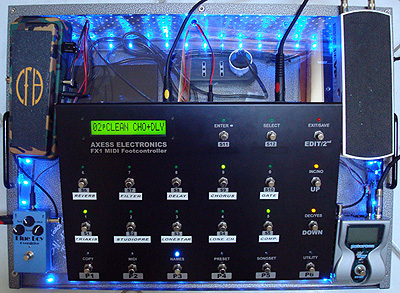 MS: Yeah, I used actually a couple of MI Audio pedals, which I endorse. One is called the Blue Boy, which is a sort of Tube Screamer on steroids. It works better than a Tube Screamer to my ears, it has wider controls, and it’s less of a tone-sucker than the Tube Screamer, which takes a lot of the signal out of the guitar. And then another pedal which is called the Tube Driver, and the Tube Zone (also from MI Audio), which is more of a distortion pedal. I use it just for “Memories,” I think – that was the TriAxis on the clean patch with the distortion box in front, and that’s all.
MS: Yeah, I used actually a couple of MI Audio pedals, which I endorse. One is called the Blue Boy, which is a sort of Tube Screamer on steroids. It works better than a Tube Screamer to my ears, it has wider controls, and it’s less of a tone-sucker than the Tube Screamer, which takes a lot of the signal out of the guitar. And then another pedal which is called the Tube Driver, and the Tube Zone (also from MI Audio), which is more of a distortion pedal. I use it just for “Memories,” I think – that was the TriAxis on the clean patch with the distortion box in front, and that’s all.
IC: Were all the delays and reverbs done in Pro Tools?
MS: That’s all from the board, yeah.
IC: Tracking back, can you talk a little bit about your background in music and guitar?
MS: Well, I got started when I was like 9. I got my very first electric guitar and I started playing and learning Van Halen, Satriani, and stuff like that. But I was just a kid – I couldn’t take it too seriously. Then I switched to the drums when I was 12, 13 maybe, and I played drums for a couple of years. Then I couldn’t play the drums because of the neighbors… I didn’t have an isolated acoustic room to play the drums in. I had to look for another instrument, because I couldn’t stay without playing, and I went back to the guitar and I never looked back since, actually. I still play the guitar.
IC: What were you doing at the time when you got the gig for Elements of Persuasion?
MS: I was 24 – it was 2004. I was at a turning point, actually. I didn’t know what to do, because I wasn’t doing enough sessions to pay the bills and live off of music. I was at a turning point, and probably someone from the sky watched me and gave me the opportunity to get in touch with Matt Guillory and basically start a new career with James. I was doing nothing more than teaching, which actually bored me a lot at the time because I felt I had something to prove, but I didn’t have enough knowledge and work exposure to let the world know what I was doing. So the LaBrie gig came just at the right time.
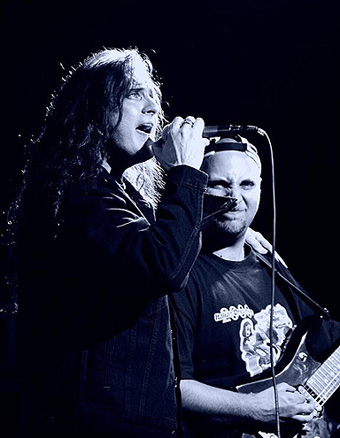
Marco with James LaBrie
IC: How did you connect with Matt Guillory and eventually get to audition for James LaBrie?
MS: Well, that came from a mutual friend. I was in touch with Alex Argento, who is a keyboard player from Italy, and he basically called me up to take part on his record. So Alex had Matt Guillory’s chat account and one night he said ‘Hey, I’m going to introduce you to Matt.’ And I said ‘Oh, cool.’ I knew Matt from the previous LaBrie record and from his band Dali’s Dillema’s record. So we started talking and sharing files and we basically liked each other’s styles, so when it came up to find a substitution to Andy Timmons, (who was unable to record anymore, due to scheduling compatibility) he basically got my name to James, I was auditioned, and eventually I got the gig.
IC: Now, let me get this straight – was Andy Timmons supposed to be playing guitar on that record before you?
MS: Andy and Matt Guillory met up around May 2004 – so four months before I got called – and everything was basically ready to be recorded: the studio was set up, Andy had the songs, and he recorded demos for the songs. Then it happened, as I recall, that he had to leave for his solo tour during the time the label had booked the studio for the recording of Elements Of Persuasion, so he couldn’t do the gig anymore. Matt had to find a quick solution to that, and he knew me and proposed me as soon as he got the Timmons news.
IC: I had no idea about that. Who was responsible for the heavy riffs then?
MS: That’s me and Guillory. He wrote the demos and played the guitars on them. We played what he played and I just added my own stuff as far as solos go. But basically the rhythm, outside a couple of spots, is just Guillory or Brian Wherry, and I replayed their parts.
IC: It would have been surprising to hear Andy Timmons playing the drop-tuned metal kind of riffs.
MS: Actually, I have some demos with Timmons on it, and it was totally different – it was sonically different and the playing was different, because he was more on the bluesy side and the tone he was using to track demos was very, very bluesy. It was like the Resolution tone – very bluesy and very dark, but not aggressive at all. When I met Andy last March in Italy he was like ‘Well, I would have had sounded crusty on that record, so it’s good that you did that.’
IC: What was the audition like?
MS: It was on a couple of songs off the record, which were in demo form, and Matt sent me the songs without the guitars. All I had to do was record some guitars, and show James what I could do, and he was pretty happy about the results. He called me a couple of weeks after I sent the demo, and I was in.
IC: There’s a video of you on YouTube recording the ‘Alone’ solo. Was that one of the actual takes on the album?
MS: That was in Canada, back in 2004. We were just recording the parts and Matt Guillory was filming, and those were the actual parts that you can hear on the record. I was very, very lock-and-load at the time, so even if I was being filmed, I didn’t care about it. Someone else could have been pretty scared about having a video camera at the very first important recording of his life, but I tried to not think about it. Matt was nice enough to give me the tapes of the recording videos.
IC: James seemed pretty happy about that take.
MS: He was like ‘Oh, totally – this is tasteful!’ (laughs) and something like ‘That’s totally Andy Timmons there.’ He was really happy to have Andy on board – he was so stuck with Timmons in mind, that maybe he was searching for that kind of playing, which was the kind of playing that I was enjoying at the time. I still do, but at the time I was really into the Timmons playing. So he was searching for that melodic approach with not too many notes, and just the right amount of fire. But he was very, very happy about the results.
IC: What’s your favorite cut off of Elements of Persuasion?
MS: Definitely ‘Slightly Out Of Reach.’ It was then – it is right now. That’s my favorite song and my favorite solo. That was my audition song, actually – it was the song where I got to show James what I could come up with on the guitar. That’s one of the few songs where I actually wrote all of the guitar parts – it’s totally me from the cleans to the crunchy rhythms. It’s one of the few songs, together with ‘Understand’ and maybe ‘Smashed,’ where I play the acoustic, where I play just my stuff without having to replay Guillory’s or Brian Wherry’s parts.
IC: And how about your solo record – what’s your favorite moment off of that?
MS: Well, I don’t have a favorite favorite song, but if I had to choose, I would say ‘Sunset Lights.’ It’s one of the first songs I wrote for the record, and it’s more on the melodic side. ‘Andromeda’ is also one of my favorites, but I think ‘Sunset Lights’ reflects my approach more to the playing and to the writing as it is now. I always had the progressive roots and the hard rock roots, but I think for me I’ve found the perfect mix between the heaviness and the melodic effect in ‘Sunset Lights.’ So if I had to choose one song off the record it’s definitely that.
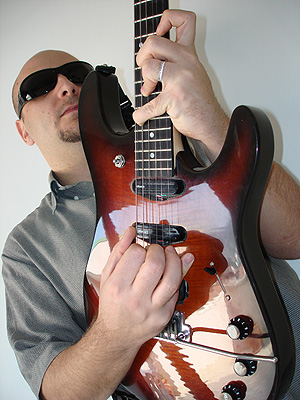 IC: What kind of stuff do you like to listen to nowadays in your free time?
IC: What kind of stuff do you like to listen to nowadays in your free time?
MS: Well, aside from the nü-metal stuff… I have in my car the latest Richie Kotzen record, Return Of The Mother Head’s Family Reunion, which I absolutely love. It’s one of the best records I’ve ever heard from him – his singing abilities are just awesome and he’s an amazing guitar player. I love him and I spent so much time trying to get down his technique and stuff, so that’s one of the records I’m really listening to a lot.
IC: What are your general plans for the coming years?
MS: Well, I wish to play live a lot. That’s one of the things I would love to do more of – to play live and to tour as much as I can. Aside from my gig here, I have another show with one of the sessions I did when I came from the Elements Of Persuasion Tour. It is a big opera called Magni Animi Viri, which is going to be touring and the first show will be in München, Germany in June. Yeah, touring as much as possible and doing some cool collaborations and sessions – that’s my plan.
IC: Final question – any advice to aspiring musicians?
MS: Well, there’s so much advice that I have to get also, but if I have to give advice I would say to keep an open mind and listen to as much music as one can, without having regrets about a band or something because you hear some people say, ‘that band is a Top 40. That’s not worth listening to.’ I’m not that guy, because if something is very good and cool and works, there’s something behind it that makes it work. So my advice is to have an open mind for what concerns the music in general without having preclusions at all, practice as much as one can, and try to learn as many styles as possible.
Special thanks to Chris Dingman for the transcription of this interview.



